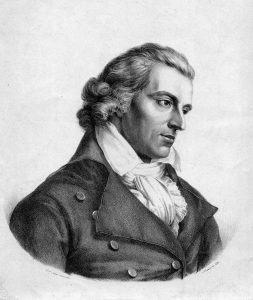“All Men Become Brothers” – A poem made Friedrich Schiller immensely popular with the Jews promising them their integration in society at large…
Always just before midnight, Beethoven’s prelude to the “Ode to Joy” is heard on Deutschlandfunk, the German national broadcaster, and it is increasingly played to tune us into the forthcoming European election. However, it is the instrumental version which serves as the European anthem, not the choral movement with Friedrich Schiller’s poem “An die Freude” (1785), as it was suggested by Richard von Coudenhove-Kalergi in 1955. Count Coundenhove-Kalergi, the founder of the Pan-European Movement, was aware of the electrifying effect of Schiller’s celebration of the brotherhood of man. Already in the early 19th century, this poem had hit the nerve of European Jewry. The ideals of the Weimar poet, playwright and philosopher – freedom and brotherhood, education and human dignity – were understood as a program that no longer excluded Judaism but promised its integration in society at large.

Friedrich Schiller (1759-1805) had only a few Jewish contacts, although he knew the writings of Moses Mendelssohn and had a high regard for Salomon Maimon. In 1783, he gave an account of Jewish life in rural Thuringia. Staying at the Bauerbach estate near Meiningen, he remarked, “I’m just annoyed that so many Christians make so little out of their religion, while as I see in Bauerbach and Walldorf the Jews are very fervent in their religious devotions!” While he praised the “Hebrew nation” as important for “universal history” in his treatise Ueber die Sendung Moses (1790), he also adopted a number of anti-Jewish stereotypes in his works. This ambivalent attitude was hardly noticed by his Jewish followers. It was the poet’s quest for physical and spiritual freedom that resonated with all factions of German Jewry. The liberal Gabriel Riesser observed in 1842 that “the Jewish youth turns to Schiller, with whom they learn to read, to think and to feel”, while Rabbi Samson Raphael Hirsch, a founding father of modern Orthodoxy, praised Schiller 1859 as the dawning light of an aurora that will make men stand up immediately and take away the blindfold from their eyes.
Between 1817 and 1912, the “Ode to Joy” was translated at least five times into Hebrew – first in the context of the Jewish Enlightenment, then around 1900 in the wake of the Jewish Renaissance movement. Translations and imitations of Schiller’s poems and plays were published in Galicia and later in Russian Poland. Traditional Jewish homes which banned secular literature made an exception: ”Schiller’s works were among those books that were allowed to be read without hindrance at dusk,” recalled Samuel Meisels in 1922. “The day had to be dedicated to Torah studies. The writings of Mendelssohn were dismissed, many Hebrew books were on the index, but Schiller was free.” Throughout Central and Eastern Europe, Schiller’s writings and his lofty ideals were identified with German culture.
Jitzchok Leib Peretz’s Yiddish version of Schiller’s “To Joy” does not speak of people becoming brothers, but of the fact that they already are: the equality of man is not a goal to be achieved, but an accepted fact. However, Perez died in 1915 and did not witness the atrocities of the Great War, the sweeping disappearance of individual freedoms under the Nazis, and eventually the destruction of European Jewry. In the aftermath of World War II and the Shoah, Gershom Scholem reasoned: “Schiller was the most visible, most impressive and most resonant cause for the idealistic self-delusion to which the relationship of the Jews to the Germans led.”■
